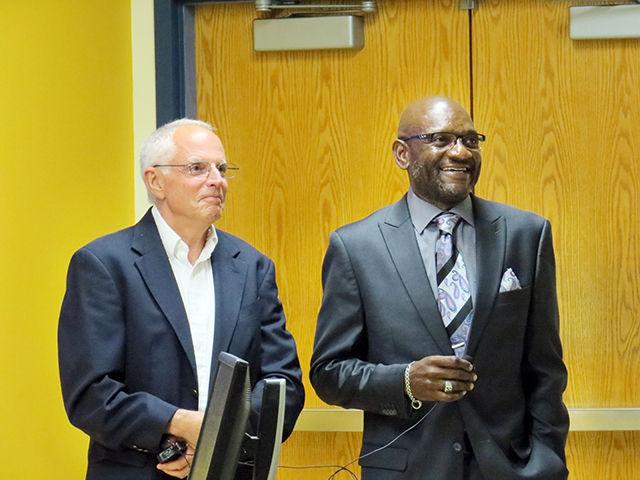About 300 people gathered in Dabney Hall Wednesday evening to listen to a man who had 20 years of his life stolen from him and is now working to reform the criminal justice system in the United States.
Darryl Hunt, who is black, was 19-years-old when he was wrongfully convicted of raping and murdering a white newspaper copy editor in Winston Salem, North Carolina, in 1984.
Hunt would go on to spend the next two decades in prison until the Innocence Project, a nonprofit legal organization that looks to reverse wrongful convictions, worked to get Hunt out of prison.
“If you haven’t seen a miracle, you’re looking at one today,” Hunt said.
Hunt spoke in conjunction with Richard Rosen, UNC-Chapel Hill professor of law emeritus, who had previously directed the Innocence Project chapter at the UNC School of Law.
Since being released from prison 10 years ago, Hunt has sought to raise awareness of holes in the criminal justice program by advocating for prisoners who he believes are innocent through the Innocence Project, as well as his own organization, the Darryl Hunt Project for Freedom and Justice.
Since the inception of the Innocence Project in 1992 at the Benjamin Cardozo School of Law at Yeshiva University in New York, 329 people have had their convictions overturned, Hunt said.
Despite that 20 years of Hunt’s life had been stolen, he said he is dedicated to a message of forgiveness. While in prison, he discovered Islam. This gave him the power to let go of the bitterness. Religion gave him a better understanding of what it meant to forgive, and he said he couldn’t have survived without it.
“You have to be willing to forgive those who hurt you,” Hunt said.
Rosen said that the hardest part of working with the Innocence Project is knowing that somebody is innocent, but not being able to do anything for him or her because DNA evidence is only available for a small amount of cases, or it gets lost after years have gone by. If there is no testable evidence, lawyers cannot help.
Hunt said that it is important for people to ask questions and never assume somebody is guilty when they are arrested. He also said that the best thing people can do to help those who have been exonerated is to try to be understanding.
“We can do better, but the only way we can do better is for us to treat each other with respect,” Hunt said.
The program was part of the Social Justice Series presented by students in the Park Scholarship program.
Anna Paschall, a senior studying biology, organized the event. Paschall said she first became interested in the criminal justice system after she heard Hunt speak to her high school and is interested in raising awareness on the topic.
Student Body President Khari Cyrus said that the evening’s proceedings touched him on a personal level as somebody who intends to attend law school. Cyrus said that he believes Hunt’s example of being able to adapt and grow despite his circumstances is an important lesson for students.
“What really resonated with me was his message of forgiveness and acceptance,” Cyrus said.








